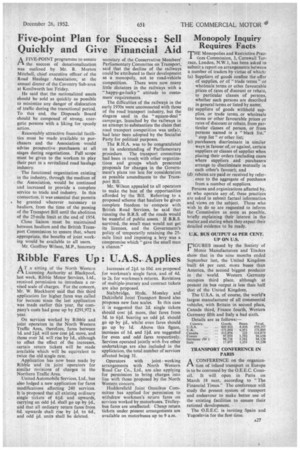Five-point Plan for Success : Sell Quickly and Give Financial Aid
Page 29

If you've noticed an error in this article please click here to report it so we can fix it.
/X FIVE-POINT programme to ensure it the success of denationalization was outlined by Mr. R. Morton Mitchell, chief executive officer of the Road Haulage Association, at the annual dinner of the Coventry Sub-area at Kenilworth last Friday. He said that the nationalized assets should be sold as quickly as possible to minimize any danger of dislocation of traffic during the transitional period. To this end, the Disposals Board should be composed of strong, energetic persons with a liking for speedy action. Reasonably attractive financial facilities must be made available to purchasers and the Association would advise prospective purchasers at all stages during negotiations. Full scope must be given to the workers to play their part in a revitalized road haulage industry. The functional organization existing in the industry, through the medium of the Association, would be continued and increased to provide a complete service to trade and industry. In this connection it was essential that permits s be granted wherever necessary to hauliers, from the time of the passing of the Transport Bill until the abolition
of the 25-mile limit at end of 1954.
Close liaison must be maintained between hauliers and the British Transport Commission to ensure that, where appropriate, the benefits of joint working would be available to all users.
Mr. Geoffrey Wilson, M.P., honorary
secretary of the Conservative Members' Parliamentary Committee on Transport, said that the decline of the railways could be attributed to their development as a monopoly, not to road-vehicle competition. There were now many little dictators in the railways with a " happy-go-lucky " attitude to customers' requirements. The difficulties of the railways in the early 1930s were unconnected with those of the road transport industry, but the slogans used in the " square-deal " campaign, launched by the railways in an attempt to substantiate the claim that road transport competition was unfair, had later been adopted by the Socialist Party for political purposes. The R.H.A. was to be congratulated on its understanding of Parltamentary procedure. The transport committee had been in touch with other organizations and groups which presented proposals for changes in the Government's plans too late for consideration as possible amendments to the Transport Bill. Mr. Wilson appealed to all operators to make the best of the opportunities afforded by the 'Bill. Referring to a proposed scheme that hauliers be given complete freedom to compete with British Road Services, he said that running the B.R.S. off the roads would be wasteful of public assets. If B.R.S. survived, the small man would not get its licences, and the Government's policy of temporarily retaining the 25mile limit and imposing a levy was a compromise which" gave the small man a chance."












































































